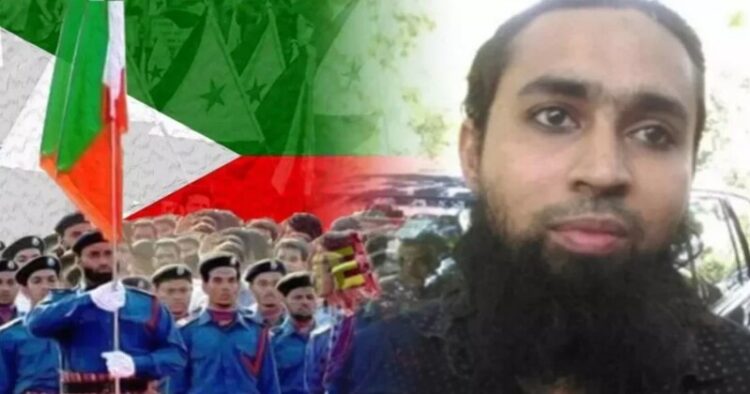In a dramatic turn of events, terror suspect Sadiq Basha (40) was apprehended in Thiruvananthapuram on February 25, sending shockwaves through the capital city just days before Prime Minister Narendra Modi’s scheduled visit. The arrest raises concerns about security measures as PM Modi is slated to address a massive rally in connection with BJP state president K. Surendran’s “Modi’s Guarantee Yatra” on February 27.
Sadiq Basha, who arrived in Vattiyurkkavu, Thiruvananthapuram, accompanied by three organizational colleagues—Nurul Haleeq, Nassar, and Shahul Hameed—had recently faced serious terror charges by the National Investigation Agency (NIA). The arrest comes mere hours before the Prime Minister’s anticipated visit to the city.
the arrest of terror suspect Sadiq Basha and his associates—Nurul Haleeq, Nassar, and Shahul Hameed—from Tamil Nadu in Thiruvananthapuram has shed light on potential surveillance lapses, raising concerns about security protocols in the run-up to Prime Minister Narendra Modi’s scheduled visit.
The trio hailing from Nagapattinam, Thiruvallur, and Greater Chennai, respectively, were taken into custody after it was discovered that their vehicle bore a fake ‘Police’ sticker, underscoring the need for thorough and effective surveillance measures. The lack of proper monitoring allowed the suspects to reach Thiruvananthapuram, a high-security zone, on the eve of the Prime Minister’s visit.
Authorities are now delving into Sadiq Basha’s connections with his companions, identified as Nurul Haleeq, Nassar, and Shahul Hameed. Both the Kerala Police and the Central Intelligence Agency are actively investigating the circumstances surrounding their arrival in Thiruvananthapuram.
The arrest has brought to light Sadiq Basha’s previous run-ins with the law. The National Investigation Agency (NIA) had earlier filed charges against Basha and three others in an ISIS propaganda case spanning Kerala and Tamil Nadu. The chargesheet indicated their operations near the Tamil Nadu and Kerala borders, alleging the recruitment of technical experts for ISIS and the formation of three organisations for propaganda purposes. The group was also accused of maintaining close ties with ISIS cells in Sri Lanka.
Despite being out on bail, Sadiq Basha’s arrival in Thiruvananthapuram was seemingly unnoticed until the dispute over his divorce from his second wife erupted in a local mosque.
In a startling revelation, the Special Protection Group (SPG) has seized crucial items, including SIM cards and hard discs, from the residence of terror suspect Sadiq Basha in Vattiyoorkkavu, Thiruvananthapuram. The timing of the discovery, just hours before Prime Minister Narendra Modi’s visit to the city, has intensified concerns over potential security lapses.
Sadiq Basha, 40, was arrested on February 25, along with three associates—Nurul Haleeq, Nassar, and Shahul Hameed—in the capital city. The group’s arrival from Tamil Nadu was marked by the use of a vehicle bearing a fake ‘Police’ sticker, pointing to a lack of proper surveillance measures.
The seized SIM cards and hard discs are expected to be crucial in ongoing investigations by both the Kerala Police and the Central Intelligence Agency into Basha’s connections and potential networks in the region.
Sadiq Basha’s past brushes with the law have further deepened the complexity of the situation. Cases against him are pending in Tamil Nadu, where he faced charges related to ISIS fundraising and recruitment. Notably, in June 2022, NIA arrested Basha and four others in connection with ISIS activities, including fundraising and recruitment.
NIA alleges that Basha, who was out on bail, has ties to ISIS and played a role in various anti-national activities. The recent discoveries at his residence have raised questions about the efficacy of surveillance, particularly given his notorious history.
Basha’s connections in the Vattiyoorkkavu Kallumala region are under scrutiny, with allegations of close associations with key accused in a murder case in Kaliyikavila, Thiruvananthapuram district. The agencies are investigating links to organizations such as Khilafat Party of India, Khilafat Front of India, and the Intellectual Students of India, which are accused of promoting ISIS terrorism.
His presence in Thiruvananthapuram on the eve of the Prime Minister’s visit has set off alarm bells. Reports indicate that Basha had befriended locals in Vattiyoorkkavu, maintaining a low profile until the recent NIA raid exposed his criminal background.
Basha’s criminal history is rife with allegations of training youths in martial arts for ISIS recruitment, involvement in numerous cases of illegal arms possession, and attempts to murder police officers. In 2017, he was reportedly arrested in North Chennai under the Arms Act and for illegal financial transactions.
The timing of Basha’s reappearance, coupled with his extensive criminal record, adds a layer of urgency to ongoing investigations. Authorities are working to uncover the extent of his activities, spread across Tamil Nadu and Kerala, and assess potential security threats.
As the agencies delve deeper into the evidence unearthed during the raids, the implications of Basha’s presence in Thiruvananthapuram, especially with the Prime Minister’s visit imminent, underscore the critical need for heightened security measures and a comprehensive review of intelligence protocols to safeguard against potential threats in the future.




















Comments